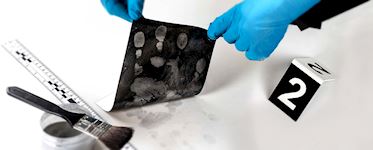Forensic Science and Profiling Course - inc. Exciting Case Studies!
e-Careers.Lifestyle
Summary
- Certificate of completion - Free
Overview
So you enjoy a good Murder Mystery, and are intrigued by the dimensions of a criminal mind.
Then here is an opportunity for you to discover how an entire investigation process is brought together. This beginner’s course is the perfect introduction to the world of forensic science and profiling. Real case studies are explored as roles played by a variety of experts endeavour to achieve justice for victims.
Why should I enrol onto this course?
This thought-provoking programme has been organised into 8 easy-to-digest modules, which promise to keep you challenged throughout. The great thing about this course is that its flexibility means you can study at your own pace, from anywhere and at a time that best fits around your existing commitments.
Course media
Description
KEY LEARNING POINTS
This course will teach you how to trace evidence at a scene of crime or mishap, in order to collect information for investigation.
- Understand the beginning's Forensic Science.
- Discover the History of Forensic Science-from 3rd Century BC.
- Understand Important discoveries in the Field of Forensic Science.
- Understand from where the word "Forensic" originates.
- Understand the structure and sources of DNA.
- Look at the main reason why DNA can and is contested in court.
- Learn the three main fingerprint patterns.
- Identify the three categories that finger prints are placed into at a crime scene.
- Understand what evidence can be produced from a "Forensic Footwear" print.
- Understand the role of a Forensic Odontologist.
- Recognise the purpose of using Microscopic Examination for hair analysis.
- Discover the contents of a crime scene officers kit.
- Understand the concept of an Autopsy.
- Explore how a body will decay by Autolysis and Putrefaction.
- Learn about poisons.
- Understand the concept of "Offender profiling" and "Geographical Profiling".
- Understand the purpose of producing a criminal profile and what information is retained.
- Understand Lombroso`s theory and categorisation of the three types of criminals.
- Understand the profile of a organized perpetrator/offender.
- Gain an understanding of the characteristics of "The Disorganised Asocial" Offender.
- Understand the profile of three Types of Rapists.
ADVANTAGES OF THIS COURSE
- No pre-requisite.
- Readily available for you to access online from anywhere.
- At the end of each unit there is a multiple choice question assessment, which is a great way to help you remember the main points of each lesson and confirmation that you have retained the essential knowledge.
- Course completion certificate included.
UNITS OF STUDY
Lesson One
- Introduction to Forensic Science
- The History of Forensic Science-from 3rd Century BC
- Discoveries in the Field of Forensic Science
Lesson Two
- Forensics
- What is DNA?
- Mitochondrial DNA
- DNA and the Law
- Amplified DNA
- Operation Phoenix
- The Royal Family of Russia
- Robert Melias
- Colin Pitchfork
- The Murder of Helen McCourt
- The Murder of Leanne Tiernan
- Jules Mikus 2001- New Zealand
- The Murder of Hyo Jung Jin
Lesson Three
- The History of Fingerprints
- Forensic Footwear
- Ear Prints
- Palm Prints
Lesson Four
- Forensic Odontology
- Hair
- Trace evidence-fibres
- The Salem Witch Trials
- Ted Bundy
- The Chi Omega Murders
- Napoleon Bonaparte - suspicious death?
- John Vollman
- The Murder of Ruby Annie Keen
Lesson Five
- Crime Scene – Murder
- Chemical Pollution at the Scene of a Crime
- The Autopsy
- Positional asphyxia/postural asphyxia
- Saponification/Adipocere
- Decomposition
- Patrick Higgins
Lesson Six
- Poisons
- Poisoners
- The Marsh Test
- Doctors who kill
- The Case of Charles LeFarge
- Dr. Pierre Marie Bougrat
- Dr Harold Shipman.
- Michael Swango
Lesson Seven
- Psychological Profiling Including a Brief History of Profiling
- Early Profilers- Kirk 1900
- 1950`s Ernst Kretschmer
- Dr James Brussel
- Serial Killers
- FBI Six Stages of Profiling
- Investigated Psychology Using Five Factors
- Behavioural Evidence Analysis
- New York Pipe Bomber
- Jack the Ripper
Lesson Eight
- A profile of the organized perpetrator /offender
- The Disorganized Asocial Offender
- Types of Rapists
- Profiling
- Victimology
- The Suffolk Strangler a.k.a. The Ipswich Ripper-disorganised serial killer
- David Berkowitz
- Robert Hanssen
- Jerome Brudos-lust killer
- Andrei Chikatilo
12 Months Online Access
Course completion certificate included.
Free technical support available 7am-7pm GMT via email, telephone or online chat.
Requirements
This course is compatible with Windows, Mac, iPhone, iPad and Android devices.
Learn anytime, anywhere!
Questions and answers
Hi there, Just curious as to what this course is equvalent to qualification-wise?
Answer:Hi Dasiy, Thank you for contacting us. This course will teach you how to trace evidence at a scene of crime or mishap, in order to collect information for the investigation. This is a knowledge-based training and after completing the course you will be honored with the course completion certificate. Regards, Jason
This was helpful.
Certificates
Certificate of completion
Digital certificate - Included
Reviews
Currently there are no reviews for this course. Be the first to leave a review.
Legal information
This course is advertised on reed.co.uk by the Course Provider, whose terms and conditions apply. Purchases are made directly from the Course Provider, and as such, content and materials are supplied by the Course Provider directly. Reed is acting as agent and not reseller in relation to this course. Reed's only responsibility is to facilitate your payment for the course. It is your responsibility to review and agree to the Course Provider's terms and conditions and satisfy yourself as to the suitability of the course you intend to purchase. Reed will not have any responsibility for the content of the course and/or associated materials.


